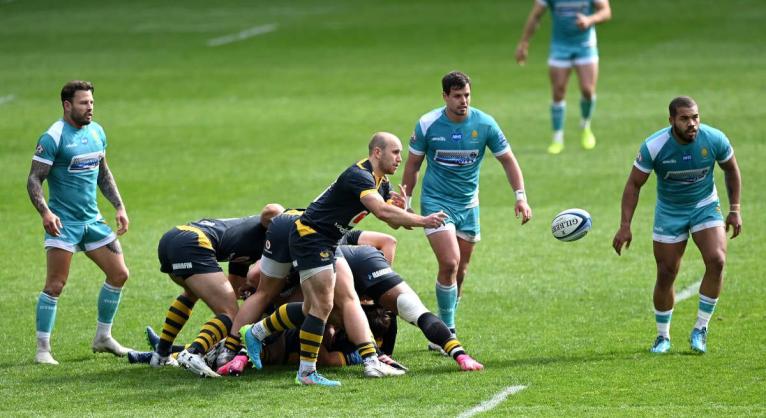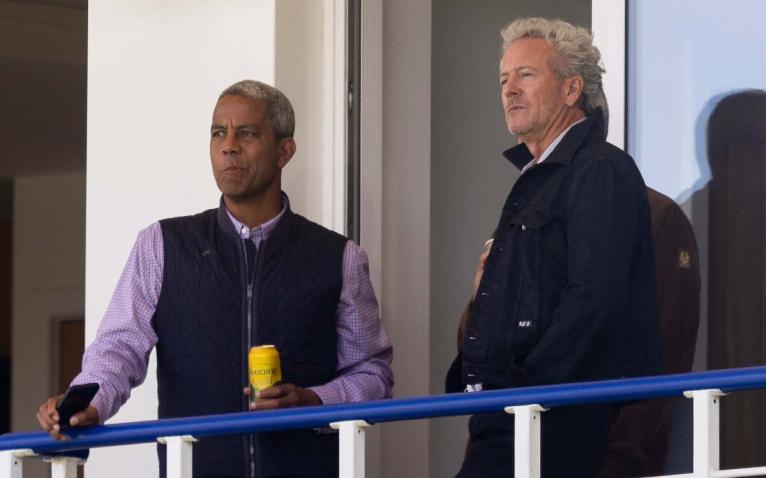There’s not much Simon Cohen has not seen before on a long and varied career in rugby administration. The former Chief Executive of Leicester Tigers has had a circuitous journey in the sport, that has seen him go from lawyer to player agent, to Head of Rugby Operations and Chief Operating Officer at Tigers before the promotion to the CEO gig as the capo. As a result, he is well placed to provide a considered opinion on a sport that has seen its fair share of negative headlines in recent months.
Given the recent administration of two clubs, the ongoing concussion question and the governance issues at both the RFU and the WRU – it’s worth asking the erudite administrator whether is this the most precarious time in professional rugby’s history? After a long pause. “No. I think probably when the game first went professional, it was more precarious, because nobody quite knew what was going to happen”, he said. “And there were no TV deals really in place, not to the level that they are now. Crowds were as they were back in the amateur days, which were significantly less than they are now.”
The RugbyPass+ interview took place days before the news from Leicester Tigers announcing majority shareholders Peter Tom and Tom Scott were investing up to £13m of their own funds into the club. This is to alleviate pressures caused by a working capital shortfall, with an expected breach of their HSBC overdraft in the first quarter of this year. Indeed, the news that England’s biggest club is facing financial difficulties should make everyone in rugby take notice and gives weight to what Cohen has to say about rugby and its parlous finances.

Cohen has now finished his two years’ gardening leave since leaving Leicester in the summer of 2020, at the height of the pandemic. He is now consulting for player agents, Green Room Sports, a role that he states he is “thoroughly enjoying.” More recently, he has been working alongside Steve Diamond as part of a group that was trying to purchase Worcester Warriors out of administration, a venture that has, for now, been unsuccessful.
It was at both Worcester and at Wasps where the rugby world was rocked, when, within weeks of each other, both clubs went into administration and ultimately expelled from the Premiership. These events have seen rugby finances and its governance come under forensic scrutiny, with both the RFU and Premiership Rugby under pressure to explain what happened and what they are doing to prevent a repeat. For Cohen, the sad demise of both clubs was entirely predictable.
“I was pretty sure that Wasps would go bust from the very day that they moved to Coventry, because I didn’t see any way that they could repay a £35m bond that was secured against the stadium. At the time that they couldn’t then repay the bond, it’s reasonable to assume that the dominoes will fall given that the bond holder security was against the stadium, and that’s exactly what happened.”
The world of rugby relies heavily, especially in England, on privately funded private funding, making up a shortfall for which reappears at club after club, year after year.
Cohen agrees that Worcester was slightly different case. “Any club which doesn’t drive a significant amount of revenue through the gate, or practically any club at the moment has to fund a short fall, and if the ownership is in the hands of people unable to fund that shortfall then you have serious issues. It’s clear that the Worcester owners fell into that category. And that’s part of the problem, isn’t it? The world of rugby relies heavily, especially in England, on privately funded private funding, making up a shortfall for which reappears at club after club, year after year.”
It is on this point that Cohen warms to his theme and looks ahead to where future issues could arise in Premiership rugby. Indeed, he is an informed individual who feels more clubs are likely to get into financial difficulties unless changes are made, citing a reluctance to invest as being a clear and present danger to English rugby. “Investor fatigue is clearly a significant factor. Not only have you got people who are reluctant to buy a rugby club, but the next logical step would be that those who current club owners would get tired, or not want to fund at those levels going forward. You can see the situation getting worse than it is now. Ownerships that have been in place for a number of years and have lost a considerable amount of money. At some point, you have to think that that will come to an end.”
For someone who has spent considerable time at the coalface, these are robust statements. Rugby clubs in the professional era are now businesses and are treated as such, as Wasps and Worcester found out to their detriment with their recent issues. To drive sustainability, there usually two prongs of a core strategy – grow revenues and cut costs. Looking at rugby clubs, other than the playing costs, what are the other expenses that can be controlled? Cohen does not believe there are many: “If you look at most clubs in comparison to some business norms, you’d have to say that rugby clubs, apart from playing costs, are pretty lean, generally, because a lot of businesses would work on the old maxim that they would spend 10% of their budget on marketing. I can’t see a rugby club anywhere that gets up to those levels. The issue is across the playing costs.”

As Chief Executive of Leicester Tigers, Cohen spent years having to tackle the challenges caused by the Premiership’s salary cap. A mechanism that helps control playing costs and deliver a competitive league. The cap has come down to £5.1m as a response to the issues caused by Covid-19. It is scheduled to go back up again for the 2024-25 season to above £6m. Cohen’s successor as Chief Executive at Tigers, Andrea Pinchen, has already indicated her opposition to the move. Does Cohen feel the same way?
“I think the biggest problem in the English game is probably the lack of governance. I think every or most issues stem from a complete lack of governance throughout the game. What then happens is that he who shouts loudest tends to get their way. I think you’re going to need to get the governance in place to take decisions that are in the best interests of the game and the particular league, rather than an individual club. In an ideal world, you would bring the salary cap down to a level whereby the majority of the clubs are making a profit, so the game is sustainable.”
In an ideal world, again, from a purely marketing point of view, you want the best players in the league and to be competitive in Europe. And you want the England team to be as good as it possibly can be.
“Looking at the numbers, it’s difficult to say exactly what that looks like, because at the moment, included in the figures is the 25% discount that was allowed in the salary cap for pre-existing contracts when it was brought down. Those are starting to come to an end, and therefore the reduction in the salary cap is starting to bite. The accounts that appear in 24-36 months’ time, could accurately reflect what sort of a job that reduction has done in terms of minimizing losses. But when we know what that looks like, it will determine where the salary cap should be based on.”
On the other hand, Cohen argued that the league needs to be vibrant, attractive proposition. “In an ideal world, again, from a purely marketing point of view, you want the best players in the league and to be competitive in Europe. And you want the England team to be as good as it possibly can be, which means that you want the very best players to make it all an attractive package. So there has to be a balance, and to achieve that will require proper governance, of which there isn’t at the moment.”

Governance and playing costs are the consistent themes when speaking to Cohen about the myriad issues in rugby. His stint in the Chief Executive role 2012 through to 2020, saw the introduction of a marquee player, which then got increased to two – an egregious move according to Cohen. “The CEO’s, Finance Directors of a number of clubs recognised that the implementation of a second marquee player would be inflationary in terms of player wages. At that time clubs were losing money, and those people responsible for balancing the books didn’t want that to happen but because a small number of clubs wanted it to happen, and were able to gain, by hook or by crook, enough votes to make it happen, it happened and it’s not been a good thing.”
So in terms of improvements, how do we make things better? In terms of governance Cohen is clear that independence is key. “I do not think you can have individual chairmen effectively being the decision making body of PRL (Premiership Rugby Limited). Simply because with the best will in the world, they will want what is best for their club, not what’s best for the league. So the more independence, the better. For me, the PRL board should be primarily a non-executive board, not the respective chairman of the clubs.”
If you look at the Worcester situation, one of their owners had been struck off as a solicitor. That should have raised some alarm bells. Wherever there is the possibility of better governance, we as a sport should embrace that.
How about a fit and proper owner’s test, should that be implemented as in football? “Yes, I think we should. If you look at the Worcester situation, one of their owners had been struck off as a solicitor. That should have raised some alarm bells. Wherever there is the possibility of better governance, we as a sport should embrace that.”
What about central contracts? The battle between England and the clubs over access to the players has been an ever-present ever since game went professional, and has become more popular since the demise of Wasps and Worcester– is that the way forward? “No, because I think that, again, this is a short-term solution to a funding crisis. If we’re going to get the structure of the game right, central contracts are not the panacea to all ills.”
“In order to develop the club game, one of the things we need to have is the international players playing for their club as often as possible. That is part of a restructure of the game that needs to happen. I don’t think it would be helped by the introduction of central contracts.”

Better governance and setting a sensible salary cap are fundamental themes of Cohen’s vision on how to improve the game and get rugby back onto firmer foundations. But what about the calendar and the season structure? Does promotion and relegation feature in that? “Absolutely, I would have promotion and relegation. Promotion and relegation is absolutely integral from a sporting perspective to English sport. It would enhance the interest of broadcasters and fans throughout. I do think that you need a competitive second tier competition. I would focus on that before I would focus on the Premiership. Effectively look at what’s needed to make that successful and then say to the Premiership, effectively, this is what’s left over for you.”
“I think one of the key issues for developing the game is that we’ve got to have a coherent season structure. And to do that, everybody involved in the game is going to have to compromise. So for me, I would have Five Nations, I would have promotion and relegation there, so that the game in Europe can be developed. That would take out a fallow week and an international weekend. That would free up a couple of weekends. Then there is probably room for a ten-team Premiership.”
So there you have it, the Simon Cohen manifesto for delivering change and improvements in rugby union. Independent governance, a sensible salary cap level without central contracts, with promotion and relegation both domestically and at international level. It is hard to disagree with what he has proposed. Given the experiences and time served at the sharp end of rugby union in England, his ideas deserve a fair hearing.



Comments
Join free and tell us what you really think!
Sign up for free